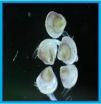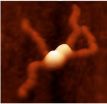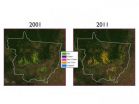(Press-News.org) Your first response to an infectious agent or antigen ordinarily takes about a week, and is relatively weak. However, if your immune system encounters that antigen a second time, the so-called memory response is rapid, powerful, and very effective.
Now, a team of researchers at The Wistar Institute offers evidence that a protein, called Foxp1, is a key component of these antibody responses. Manipulating this protein's activity, they say, could provide a useful pathway to boosting antibody responses to treat infectious diseases, for example, or suppressing them to treat autoimmune disorders. Their findings appear online in the journal Nature Immunology.
"Foxp1 has an important role in our antibody immune responses, and if we could find a way to regulate Foxp1 activity in a subset of T cells, the CD4+ T cells, it could have some profound impact on the antibody responses," said Hui Hu, Ph.D., senior author of the study and associate professor at Wistar's National Cancer Institute-designated Cancer Center.
"Repressing Foxp1 activity, for example, we may be able to make antibody responses faster-acting and more effective, which could be crucial in, say, a pandemic when time is a critical factor," Hu said. "Alternatively, if we could enhance the effectiveness of this protein, we may be able to significantly dampen the antibody responses that are unwanted in some cases of autoimmune diseases such as lupus."
Previously, the Hu laboratory determined that Foxp1 was responsible for keeping T cells—the white blood cells that mediate our immune system—on "active stand-by mode," a process called quiescence. In the present study, Hu teamed with the laboratories of Louise C. Showe, Ph.D., professor in the Wistar Cancer Center's Molecular and Cellular Oncogenesis program, which provided crucial genomics expertise, and Jan Erickson, Ph.D., professor in the Tumor Microenvironment and Metastasis program, which offered expertise in the study of autoimmunity and the activation of B cells, the cells that generate antibodies.
According to their Nature Immunology report, variants (or isoforms) of Foxp1 (called Foxp1A and Foxp1D) are critical regulators for the formation of a type of T cells, called T Follicular Helper (TFH) cells. These TFH cells then go on to enable B cells in creating long-lived, highly reactive antibodies. The proteins are transcription factors, meaning they work by binding to DNA to control which genes in these T cells are "read" or translated into protein.
In the initial days of an immune response, the Foxp1 proteins determine how TFH cells arise from activated T cells. "The two isoforms act as regulators of TFH differentiation in the early moments of the immune response, where they effectively act as gatekeepers to slow TFH development, " Hu said. "They constitute a 'double-check' system that prevents the humoral branch of the immune system from acting too hastily."
INFORMATION:
Funding for this study was provided by the National Institutes of Health (including the following grants: AI095439, AI103162, CA132098, 1S10RR024693, CA31534, AI083022, 5DP5OD012146, AI063107), Alliance for Cancer Gene Therapy (ACGT) Foundation, WAWA, Martha W. Rogers Trust, and the Wistar Cancer Center (P30 CA10815).
Wistar collaborators also include, Haikun Wang, Ph.D., Jianlin Geng Ph.D., Xiaomin Wen, Ph.D., Enguang Bi, Ph.D., Andrew V. Kossenkov, Ph.D., Amaya I. Wolf, Ph.D., Hiroshi Takata, Ph.D., Timothy J. Day, Li-Yuan Chang, Ph.D., Stephanie L. Sprout, Emily K. Becker, Jessica Willen, Lifeng Tian, Ph.D., Xinxin Wang, and Ping Jiang, Ph.D. Co-authors also include Gabriel D. Victora, Ph.D., and Jeroen Tas, from the Whitehead Institute for Biomedical Research; Shane Crotty, Ph.D. and Youn Soo Choi, Ph.D., from the La Jolla Institute for Allergy & Immunology; Changchun Xiao, Ph.D., from The Scripps Research Institute; and Haley O. Tucker, Ph.D. from the University of Texas at Austin.
Faster, higher, stronger: A protein that enables powerful initial immune response
Wistar findings suggest means of boosting initial immune response
2014-06-09
ELSE PRESS RELEASES FROM THIS DATE:
The Academy of Radiology Research featured in Nature Biotechnology journal
2014-06-09
The Academy of Radiology Research reported in the current issue of Nature Biotechnology (Volume 32, Issue 6) that patent output from the National Institutes of Health (NIH) is vital to understanding which various areas of science are contributing most to America's innovation economy. The report, "Patents as Proxies: NIH Hubs of Innovation," confirms an increased economic value of NIH patents as compared to private sector patents, as well as meaningful differences in the rate and quality of invention across different research and development (R&D) investments.
"The Academy ...
NOAA scientists find mosquito control pesticide low risk to juvenile oysters, hard clams
2014-06-09
Four of the most common mosquito pesticides used along the east and Gulf coasts show little risk to juvenile hard clams and oysters, according to a NOAA study.
However, the study, published in the on-line journal Archives of Environmental Contamination and Toxicology, also determined that lower oxygen levels in the water, known as hypoxia, and increased acidification actually increased how toxic some of the pesticides were. Such climate variables should be considered when using these pesticides in the coastal zone, the study concluded.
"What we found is that larval oysters ...
Antiviral therapy may prevent liver cancer in hepatitis B patients
2014-06-09
DETROIT – Researchers have found that antiviral therapy may be successful in preventing hepatitis B virus from developing into the most common form of liver cancer, hepatocellular carcinoma (HCC).
That was the finding of a study published in the May issue of Clinical Gastroenterology and Hepatology. Investigators from Henry Ford Health System in Detroit, Geisinger Health System in Danville, Pa., and Kaiser Permanente in Honolulu, Hawaii and Portland, Ore. participated in the study, along with investigators from the Centers for Disease Control and Prevention in Atlanta. ...
How much fertilizer is too much for the climate?
2014-06-09
EAST LANSING, Mich. — Helping farmers around the globe apply more-precise amounts of nitrogen-based fertilizer can help combat climate change.
In a new study published in this week's Proceedings of the National Academy of Sciences, Michigan State University researchers provide an improved prediction of nitrogen fertilizer's contribution to greenhouse gas emissions from agricultural fields.
The study uses data from around the world to show that emissions of nitrous oxide, a greenhouse gas produced in the soil following nitrogen addition, rise faster than previously expected ...
Coral, human cells linked in death
2014-06-09
SAN DIEGO (June 6, 2014) — Humans and corals are about as different from one another as living creatures get, but a new finding reveals that in one important way, they are more similar than anyone ever realized.
A biologist at San Diego State University has discovered they share the same biomechanical pathway responsible for triggering cellular self-destruction. That might sound scary, but killing off defective cells is essential to keeping an organism healthy.
The finding will help biologists advance their understanding of the early evolution of multicellular life, ...
Researchers recast addiction as a manageable disease
2014-06-09
Neuroscientists agree that abuse of drugs hijacks circuits in the brain that are crucial for decision-making, but society as a whole tends to stigmatize addicted people for lacking self-control. Slowly but steadily, scientists say, they are making important progress in changing the perception of addiction as they identify new therapeutic interventions that could render addiction into the equivalent of a manageable disease like diabetes.
A group of addiction researchers, for one, recently recommended to the Commission on Narcotic Drugs, part of the United Nations Office ...
Protein could put antibiotic-resistant bugs in handcuffs
2014-06-09
DURHAM, N.C. -- Staph infections that become resistant to multiple antibiotics don't happen because the bacteria themselves adapt to the drugs, but because of a kind of genetic parasite they carry called a plasmid that helps its host survive the antibiotics.
Plasmids are rings of bare DNA containing a handful of genes that are essentially freeloaders, borrowing most of what they need to live from their bacterial host. The plasmids copy themselves and go along for the ride when the bacteria divide to copy themselves.
A team from Duke and the University of Sydney in ...
Parent and child must get enough sleep to protect against child obesity
2014-06-09
URBANA, Ill. – Is sleep one of your most important family values? A new University of Illinois study suggests that it should be, reporting that more parental sleep is related to more child sleep, which is related to decreased child obesity.
"Parents should make being well rested a family value and a priority. Sleep routines in a family affect all the members of the household, not just children; we know that parents won't get a good night's sleep unless and until their preschool children are sleeping," said Barbara H. Fiese, director of the U of I's Family Resiliency Center ...
Land quality and deforestation in Mato Grosso, Brazil
2014-06-09
PROVIDENCE, R.I. [Brown University] — The state of Mato Grosso is the epicenter of an agricultural revolution in Brazil. During the last 15 years, expansion of agriculture in the state has helped Brazil become one of the world's top producers of soy, corn, cotton, and other staple crops. Despite the increase in production, the rate at which Amazon forestland in the state was cleared to make room for new farmland slowed significantly in the second half of the last decade.
Much of the credit for slowing deforestation has been given to government policies and intervention, ...
Does 'free will' stem from brain noise?
2014-06-09
VIDEO:
UC Davis researchers found that the pattern of electrical activity in the brain immediately before making a decision can predict the choice made. This video shows how these experiments are...
Click here for more information.
Our ability to make choices — and sometimes mistakes — might arise from random fluctuations in the brain's background electrical noise, according to a recent study from the Center for Mind and Brain at the University of California, Davis.
"How ...
LAST 30 PRESS RELEASES:
Study finds Earth may have twice as many vertebrate species as previously thought
NYU Langone orthopedic surgeons present latest clinical findings and research at AAOS 2026
New journal highlights how artificial intelligence can help solve global environmental crises
Study identifies three diverging global AI pathways shaping the future of technology and governance
Machine learning advances non targeted detection of environmental pollutants
ACP advises all adults 75 or older get a protein subunit RSV vaccine
New study finds earliest evidence of big land predators hunting plant-eaters
Newer groundwater associated with higher risk of Parkinson’s disease
New study identifies growth hormone receptor as possible target to improve lung cancer treatment
Routine helps children adjust to school, but harsh parenting may undo benefits
IEEE honors Pitt’s Fang Peng with medal in power engineering
SwRI and the NPSS Consortium release new version of NPSS® software with improved functionality
Study identifies molecular cause of taste loss after COVID
Accounting for soil saturation enhances atmospheric river flood warnings
The research that got sick veterans treatment
Study finds that on-demand wage access boosts savings and financial engagement for low-wage workers
Antarctica has lost 10 times the size of Greater Los Angeles in ice over 30 years
Scared of spiders? The real horror story is a world without them
New study moves nanomedicine one step closer to better and safer drug delivery
Illinois team tests the costs, benefits of agrivoltaics across the Midwest
Highly stable self-rectifying memristor arrays: Enabling reliable neuromorphic computing via multi-state regulation
Composite superionic electrolytes for pressure-less solid-state batteries achieved by continuously perpendicularly aligned 2D pathways
Exploring why some people may prefer alcohol over other rewards
How expectations about artificial sweeteners may affect their taste
Ultrasound AI receives FDA De Novo clearance for delivery date AI technology
Amino acid residue-driven nanoparticle targeting of protein cavities beyond size complementarity
New AI algorithm enables scientific monitoring of "blue tears"
Insufficient sleep among US adolescents across behavioral risk groups
Long COVID and recovery among US adults
Trends in poverty and birth outcomes in the US
[Press-News.org] Faster, higher, stronger: A protein that enables powerful initial immune responseWistar findings suggest means of boosting initial immune response





